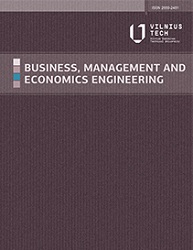THE ROLE OF DIGITAL TECHNOLOGIES IN THE ORGANIZATION OF CONTROL OVER TAX LIABILITY SETTLEMENTS OF BUDGETARY INSTITUTIONS
THE ROLE OF DIGITAL TECHNOLOGIES IN THE ORGANIZATION OF CONTROL OVER TAX LIABILITY SETTLEMENTS OF BUDGETARY INSTITUTIONS
Author(s): Larysa IVANCHENKOVA, Anatoliy MASLOV, Olha PIKHOTSKA, Halyna PARTYN, Kateryna BLISHCHUK, Mariia PIKHOTSKASubject(s): National Economy, Economic policy, Public Finances, ICT Information and Communications Technologies, Socio-Economic Research
Published by: Vilnius Gediminas Technical University
Keywords: budgetary institutions; digital technologies; digitalization; tax control; tax culture; tax liabilities;
Summary/Abstract: . Purpose – the aim of the study was to assess the impact of digital technologies on the organization of control over tax liability settlements of state-financed institutions in the general fiscal discipline system. Research methodology – specific methods of accounting and control of tax liabilities were used: Pareto analysis; cluster analysis of EU countries by fiscal discipline level. Findings – the study proved a direct relationship between the extent at which digital technologies are applied in the control of tax liabilities and the level of fiscal discipline in the country. The clustering of the EU-27 countries confirmed the cophenetic correlation between the fiscal discipline violation rate and the total averaged amount of taxes. Research limitations – caused by a large number of budgetary institutions and the difference in the territorial structure of the EU-27 countries, due to which federal Germany and unitary Bulgaria have different levels of subordination of budgetary institutions. Practical implications – the study is analytical and managerial in nature; its results assess the contribution of the digital component in the overall decision-making system. Originality/Value – the study is particularly useful for analysing the achievements, challenges and opportunities for digital transformation of the tax control system of the EU-27 in the field of control over public finance management.
Journal: Business, Management and Economics Engineering
- Issue Year: 20/2022
- Issue No: 2
- Page Range: 389-403
- Page Count: 15
- Language: English

